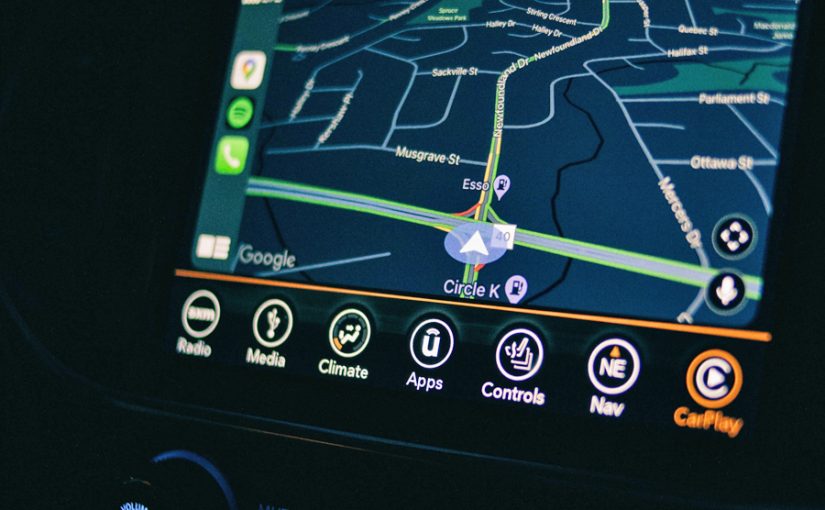A homily for the Twenty-Sixth Sunday in Ordinary Time, October 1, 2023
Ez 18:25-28, Phil 2:1-11, Mt 21:28-32
There’s a TV commercial for a company that makes promotional items, the “for certain” people, and in it a woman driving a car filled with tchotchkes for a client is taken on Mr. Toad’s Wild Ride over hill and dale and rail and through a cornfield until she comes face-to-face with a Holstein cow. The sadly mistaken GPS tells her she’s arrived at her destination.
Uh, not quite.
A while ago, in an episode of “The Office,” the Michael Scott character drives his car into a pond because he believes he should follow his GPS without question.
And way back in the 20th century, when gas stations had names like Flying A and Texaco, and they had mechanics and gave away maps and didn’t sell coffee, every pump jockey knew the directions to everywhere.
Too bad male drivers didn’t ever ask for directions.
We still think we always know where we’re going, especially if someone has given us the turn-by-turn. Regardless if it was accurate.
We humans choose whom to follow, good or bad. There are a lot of reasons for that. Let’s chat about a few of them.
We’ve been known to lemming-follow undeserving leaders over a cliff, to our own destruction. We embrace their beliefs or, more accurately, we eagerly buy the snake oil they’re selling.
One reason is that, deep within ourselves, we just plain cannot deal with the notion that we might be a little mistaken or — heaven forfend!! — a lot misled, let alone completely wrong. Totally.
So maybe we slip into denial, sugarcoating our clearly wrong thoughts and actions, and go on making sure the car doors are locked whenever we drive through that part of town.
Or maybe we’re trapped by inertia, the “that’s the way we’ve always done it” or “that’s how it’s been and how it will stay” attitudes we learn from authority figures. The authority figures often are parents, teachers, even preachers, or maybe overall community attitudes serve as the source authority.
And why would we question authority?
So we avoid “them,” deny jobs and housing and basic human rights to “them,” because that’s just the way it is.
Or maybe we’re entranced by the cult of personality, which blankets every aspect of our over-communicated lives these days. And we could dissect that for hours and still not get to its roots.
Suffice it to say, some celebrities are the furthest thing from leaders. And yet, we follow.
Once we recognize that we’re on the wrong path — because being wrong usually means we’re doing something or saying something offensive — we also acknowledge that we need to change. Or we should acknowledge it, anyway.
Oh, no; really? Change??
Change means work. Work means sweat and aching brains and muscles.
Change means uncharted territory. It’s not the way we’ve always done it, which means learning something new. That sounds too much like school.
Change means unintended consequences, the Butterfly Effect. To fix one thing, we almost always have to fix something else. And another and another. It’s never only Thing One and Thing Two.
Change means finding someone new to follow.
Fortunately, we can follow someone who always was, always is, and always will be, and who is always on the right track.
Our Gospel story today has a slightly odd tone, to my ear. I imagine a sitcom in which the yes-man is over-the-top enthusiastic to his father before heading to the beach while the naysayer is kind of oh-well both in his original answer and in his actual work in the vineyard.
(My wife suggests I watch too much television; she’s probably right.)
But I see different scenarios at work here.
One is the first son’s realization that he made the wrong decision and changed his mind. That took good sense, a little courage, the realization that his father — his authority figure — was right, and the strength within himself to follow a good leader. And to honor his father, he did a great job.
Another scenario is what happens when someone — we — are asked to make a snap decision. All too often, we knee-jerk-say No, in a throwback to our 2-year-old selves. Given a moment to reflect, we can and do choose the right option. We say Yes and mean it, or we decline for a legitimate reason.
And the flip side of that scenario is when we quickly say Yes to everything, even when we know our plates are full. If we have a people-pleasing aspect to our personalities, or if we need the ego boost that comes from being the go-to person, sometimes we cannot help ourselves. And we definitely can’t help anyone else, which usually means either a task is undone, or someone has to jump in at the last minute to do the job, probably not as well as they would have if they had had time to plan and tackle it in smaller pieces.
I don’t know if the yes-man had an overfull plate; Jesus’s either-or didn’t flesh out the story. Regardless of whether he did or didn’t, by skipping out, the first brother stuck his sibling with a heavier burden than he deserved.
Through this example, our divine leader, Jesus, makes clear that there’s always an opportunity, and divine grace, for us to recalculate where we’re going and how we’re going to get there.
Our pathfinder Christ is always before us, always behind us, and always by our sides.
